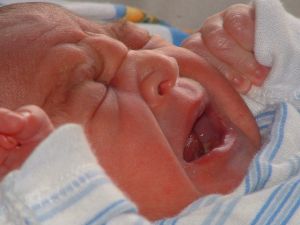Disclosure: This post may contain affiliate links, meaning we get a commission if you decide to make a purchase through our links, at no cost to you. Please read our disclosure for more info.
There is nothing more unsettling than to see a baby who appears to be very uncomfortable; especially since they are not able to communicate in terms that we, as adults, can always clearly decipher. If you are parent with a new baby, we can definitely understand why you might be a bit on edge about trying to tell the difference between different signals that your child may be trying to send you.
If you would like some clear signs of when an infant is in pain, we have five for you that can definitely help you to better understand how a baby “speaks” until they are able to actually talk.
Constant crying. OK, here’s the thing. For about the first year-and-a-half of your child’s life, they are going to do more crying than anything else when they are in need of something (or they’re unhappy about something). The key to remember about crying as it relates to pain is that if their voice elevates when they’re being touched or they appear to be inconsolable no matter how much you hold them, then it’s probably due to some kind of physical discomfort.
Changes in facial expressions. Babies can make the funniest and most unpredictable kinds of facial expressions. However, there are certain kinds that you should try and take special note of. If your child constantly does things like clinch their eyes tightly, stretch their mouth or clinch their little fists together, there could be something going on that just doesn’t feel quite right. It could be something as simple as a thread from their clothes or socks being wrapped around their toes or a mild abrasion on their face or inside of their mouth. Just make sure that if you witness any of these things to thoroughly inspect their body.
Not wanting to eat. One thing that babies are almost always up for is eating. That said, if you tend to keep your child on an eating schedule and suddenly, they appear to have a loss of appetite (especially if it’s a couple of meals in a row), that could be an indication that they have some kind of throat or abdominal discomfort.
Noticeable weight loss. Being that you are carrying your baby around a lot throughout the day, it might be a bit challenging to notice any immediate signs of weight loss. However, if their clothes suddenly seem to not fit them well or you notice that they’re looking a bit thinner while you’re giving them a bath, this could mean that they are experiencing some form of gas or they have developed some kind of food allergy.
Lots of shaking or sweating. Two things that many pain management doctors will tell you are definitely not normally is if your child is making movements that are similar to having a seizure or if they are doing a lot of sweating. If either of these are the case, especially if you’ve noticed that they appear to be pale in color and you’ve taken their temperature and it is warmer than normal, you need to call your physician as soon as possible. Ultimately, both you and your baby will be so glad that you did.

